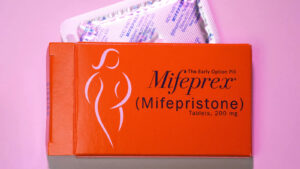On March 26, 2024, the Supreme Court of the United States (SCOTUS) heard oral arguments in the case Alliance for Hippocratic Medicine (AHM) v. The Federal Drug Administration (FDA). The plaintiff’s case challenges the FDA’s approval process and administration of the abortion medication mifepristone, aiming to prove the drug’s illegitimacy as a safe and properly administered medication. Organizations such as Planned Parenthood remain supportive of the drug’s safety and efficacy, and continue acting as a resource for those seeking reproductive care.
This lawsuit comes as the next frontier in abortion restrictions almost two years after the Supreme Court’s overturning of Roe v. Wade in June 2022—a landmark decision in which the court reversed the previous ruling that the Constitution of the United States protected one’s right to have an abortion.
Currently, mifepristone is used as part of a two-drug regimen that accounts for over two-thirds of abortions across the country. More than five million women in the United States alone have used mifepristone to terminate their pregnancies, and dozens of other countries have approved the drug for use as well.
According to NPR News, at least 63% of all abortions administered in 2023 were medical abortions involving pill form medication. Patients take one dose of mifepristone to block the production of progesterone, a pregnancy hormone, and one dose of misoprostol to cause cramping and empty the uterus. A study by the National Library of Medicine showed evidence that the combination of these pills is both a safe and effective method for abortion, whether prescribed in a clinic or through telemedicine.
Mifepristone, in conjunction with misoprostol, were approved by the FDA in 2000 with some dispersion conditions amended in the following years. While the FDA and mifepristone drugmaker, Danco Laboratories, stand by their claim that the administration followed correct testing procedures and accumulated accurate scientific evidence in its original approval, the anti-abortion physicians and organizations part of AHM aim to prove otherwise.
Originally, AHM argued that the FDA should not have approved the drug in 2000, but after switching tactics have begun arguing that mifepristone should not have been made easier to access between 2016 and 2021.
While an official decision from the court has not been revealed, in the nearly 90 minutes of oral arguments that took place on March 26, a consensus appeared to emerge that the AHM, who challenged the approval of mifepristone and subsequent actions to ease access to it, lacks the legal right to sue.

photo courtesy of Danco Labratories
Planned Parenthood Mar Monte’s Director of Leadership Giving, Stephanie Dominguez Walton, expressed her belief that the plaintiff’s case against the administration of mifepristone comes down to “cruelty, control, and specifically the government’s desires to constrict our decisions,” she said. She continued, explaining how without the use of mifepristone, misoprostol—the second drug in the regiment—may in some cases work alone, however the abortion becomes significantly more painful for the patient, as well as exhibits a much lower rate of effectiveness.
According to news outlets such as the New York Times and the Washington Post, many believe that the AHM’s lack of legal standing will result in a triumph for the FDA, and the continued approval for administration of mifepristone. Such a decision would leave in place the FDA’s current rules allowing patients to receive the drug by mail without an in-person physician visit, and to take the medication within ten weeks of pregnancy.
Organizations such as Planned Parenthood have stood as one of the largest supporters of the use of mifepristone and reproductive healthcare across the country. Specifically, Planned Parenthood Mar Monte—the Bay Area’s local affiliate—has aided individuals from over 36 states in obtaining reproductive as well as gender affirming care.
Dominguez Walton expressed that the affiliate was ready for the wave of out-of-state individuals seeking care after the fall of Roe v. Wade, and has seen a steady growth in the number of out-of-state patients since its overturning in 2022. Regardless of these increasing numbers, Dominguez Walton shared that the doors at Mar Monte’s 34 clinics are always open.
“It doesn’t matter where you come from, what your zip code is, or what your income level is. We are here for you,” she said.
Dominguez Walton shared that while the news of the overturnng of Roe v. Wade came as a tremendous disappointment, Mar Monte was prepared for the announcement and its effects. “We’ve spent several years preparing for this moment, and we have been building our capacity to serve. We are open and we are ready. It doesn’t matter if you’ve got money in your pockets or not. We will not turn you away.”
In addition to overseeing 34 clinics, Planned Parenthood Mar Monte also serves as a provider of sex education for over 190,000 students grades 6-12 in most of its county’s public schools. Through their educational programs, Planned Parenthood aims to equip students with the necessary skills and knowledge to make thoughtful decisions about their bodies and understand their reproductive rights.
At Lick-Wilmerding High School, Body-Mind Education Faculty Member and Sophomore Health Instructor Diana Suárez Ben-Hur shared that LWHS’s reproductive unit similarly aims to provide students with beneficial resources on their reproductive rights, in addition to enabling them to make confident choices about their bodies and health. Although the curriculum does not discuss abortion pills in detail, Suarez Ben-Hur shared that they are mentioned in addition to Plan B and surgical abortions, when discussing ways to terminate pregnancies.
However, students in Sophomore Health have found ways beyond the designed curriculum to educate themselves and their classes on the current events in national access to abortions through their “On the News” assignment. Every week or two, students from different sections of Sophomore Health are tasked with creating a blurb and decorating a small board about a current event regarding reproductive health or human sexuality. Student groups then present their boards and open room for discussion amongst their peers.
This semester Suarez Ben-Hur shared that many of her class’ boards have centered on the Alliance for Hippocratic Medicine v. FDA case and smaller state cases.
SCOTUS is predicted to make a final decision on the Alliance for Hippocratic Medicine v. FDA case by the end of June this summer. However, in the meantime states across the country such as Idaho, Arizona and Texas continue to restrict individuals’ reproductive rights and access to abortions.
“The political agenda is to restrict access. That’s it. It’s about controlling our bodies. Our decisions about whether or not we want to have a family,” Dominguez Walton said. “It’s about forced birth. It’s about putting people into poverty. It’s about restricting the ability for a person to make choices about their own body and their own future.”





